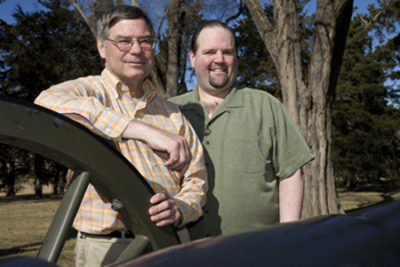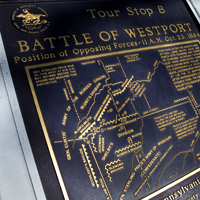“Question everything,” says Professor
“If you want to listen to a lecture full of humor and passion, Dr. Potts is your man,” said UMKC student Mark Hays, future teacher of Secondary Social Studies. “Instead of a nice, neat time line, he takes you on a journey through the past that has a number of stops along the way; and you might backtrack every once in a while. Dr. Potts fills in the missing pieces of history and challenges his students to see the past from different perspectives and with fresh eyes.”
For over 37 years, Louis Potts, Ph.D., has introduced Hays and another estimated 12,000 students to the realm of living, public history. To accomplish the detective work and analysis necessary to follow history’s unpredictable path, his students may find themselves on fact-finding trips to the library, local museums, the Missouri River or Watkins Mill State Park.
Digging In
Potts’ students deal with the essence of history, building bridges to understand their importance to the expansion of settled land; traveling with the Army Corps of Engineers to view first-hand the deleterious effects of technology; or living the 19th-century lifestyle — reciting from a McGuffey’s reader, cooking over a fire or cleaning animal pens.
“I encourage my students to build on their knowledge by starting with a pyramid: finding the facts, interpreting them and presenting their findings convincingly,” said Potts. “I want them to use their curiosity and imagination, and to know from the start that asking a good question is as intellectually challenging as providing the answer.”
Question everything
Potts was one of four UMKC instructors who secured a Teaching with Landmarks grant through the National Endowment for the Humanities. For this Landmarks project, Potts introduced his students to the stories behind familiar but often ignored symbols of the past, such as the Steamboat Arabia, the John Wornall House and the Civil War sites of the Battle of Westport.
Author, presenter and research team member, Potts also advises doctoral students and teaches early American history, including American History to 1877 and American Revolutionary Heritage. Student Sam Colston has learned more than just the subjects at hand — “Dr. Potts tells us that, as students of history, it is extremely important to question everything you hear, including his own lectures. On a personal note, this has helped me better understand all my subjects.”
Hall of Famer
Since 1996, the Kansas City Kansas Community College Endowment Association, located in Kansas City, Kan., has been inducting classes of individuals, organizations or corporations who demonstrate devotion to education. The main criteria for consideration are working to improve the quality of life through education, increasing educational opportunities for others and supporting changes that result in a higher quality of education.
This year, to the names of illustrious citizens already ensconced in the Mid-America Education Hall of Fame — individuals such as Ewing Marion Kauffman, Phil Witt, Buck O’Neil and Will Shields — was added Dr. Louis W. Potts, professor of history.
The right man for the job
Potts is a fortunate combination of curious intellectual and theatrical instructor who loves everything about the learning process — the students, the subject matter, the research and analysis. Even his discretionary time is spent learning and teaching. He works with museum boards, teachers’ groups and area historical societies to spread the word about history’s role in our lives.
When KCUR broadcasted a series in the 1970s about growing up in Kansas City, Potts and others went on location to air the radio shows: a Platt City farm, the Jackson County jail, Wayne Minor Housing Project — even Kelly’s bar in Westport.
Since 1989, Potts has forged relationships with teachers and learners in Russia. In various functions, including U.S. State Department lecturer and Fulbright Scholar, Potts visited Lenin’s home, lectured in Moscow’s Library/Cultural Center and met with fellow historians at the Russian Academy of Sciences. As a result of these relationships, Russian students have earned degrees at UMKC and elsewhere, and Potts has penned three University of Missouri Press volumes on the Russian view of the U.S.
History is never finished
Colston credits Potts with “providing a cultural understanding of American history and a relevant context in today’s world. He does a good job of showing that these were people just like us in many respects. He makes it easy for us to see the connections and to become excited about history.” Potts’ students come to share his philosophy of history education, summed up in the words of the poster on his office door: “History is never finished.”


